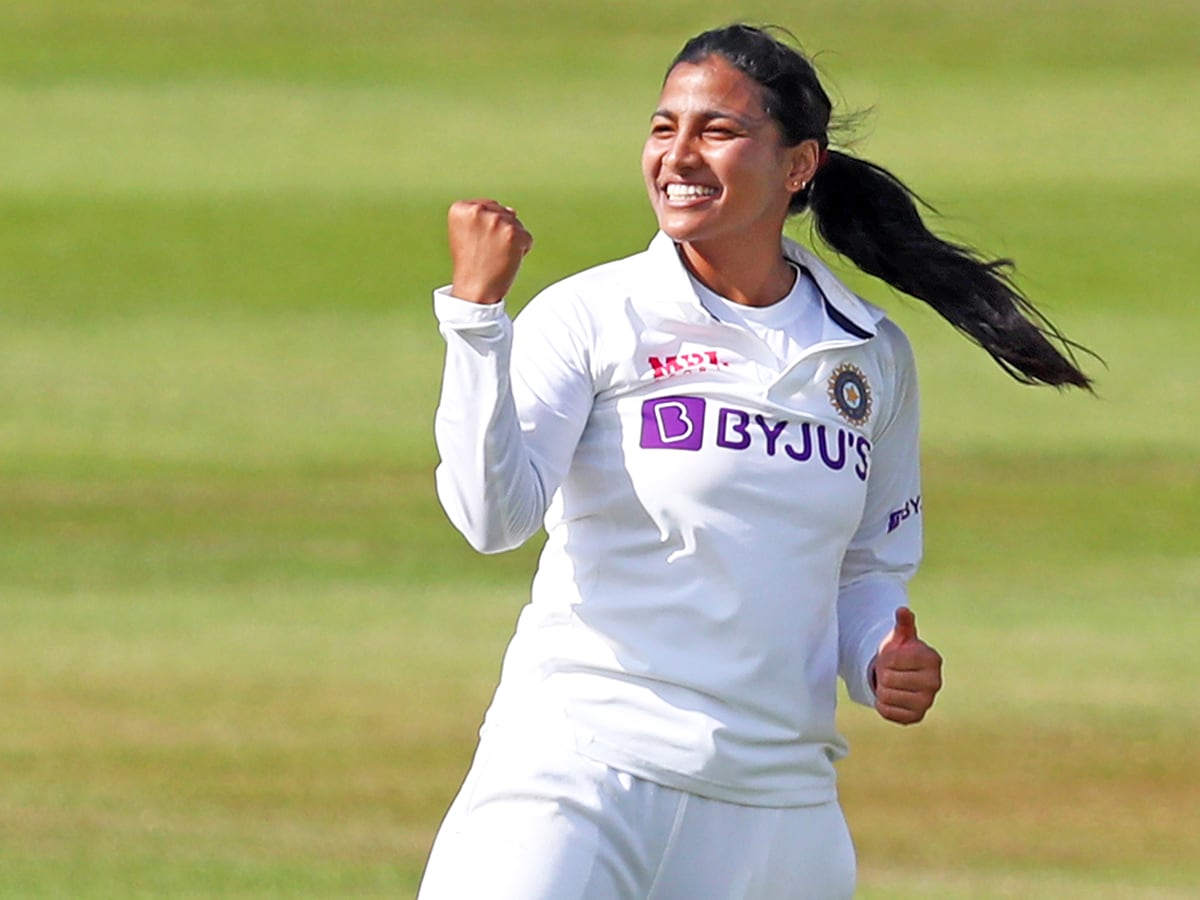 Sneh Rana. Image: Ashley Allen/Getty Images
Sneh Rana. Image: Ashley Allen/Getty Images
Sneh Rana’s international career had a five-year pause, thanks to injuries and a bad patch, that would probably have made a lot of athletes doubt themselves. Not Rana, though. The now-30-year-old returned to international cricket with a bang during a Test match against England in 2021, where she not only picked up four wickets in one innings but scored a crucial 80* in the second innings to steer the team away from a defeat. In this interview, the gritty cricketer offers a peek into her resilience and gumption. Edited excerpts:
‘Even as a kid, I was a good cricketer.’
When I was growing up in Dehradun, cricket was definitely the most popular sport around, but not for girls. Hardly any girl would play cricket, and women’s cricket wasn’t well-known at all. I
started playing with boys as usual and was the only girl among 20-25 boys, but perhaps I was a good hand even then because the boys used to fight among themselves to take me in their team. That, and the fact that I loved playing the sport, helped me choose it as a career. And I believe cricket also chose me back.
Growing up, I didn’t have much clue about training and academies. A team had once come from the outside to play against boys from our village, and I went to watch that match. Someone spread the word about me—that a girl from our village was good at cricket, and that’s how my cricket journey started.
‘Hard work always pays off’
Back then, I didn’t know much about international players, and YouTube wasn’t as big a thing as it is today. But I still used to watch Mithalidi (Mithali Raj), Jhuludi (Jhulan Goswami) and Nosheendi (Nosheen Al Khadeer) from a young age, and the lessons I learnt from them are persistence and hard work. Later, I watched them from close quarters, and they never shy away from hard work. I’ve played under Mithalidi’s captaincy, and her work ethic is second to none—despite having achieved so much, she would spend 4-5 hours in the nets. Also read: Deepti Sharma: Carving a place in the Indian cricket team
After growing up idolising these cricketers, my dream came true when I got to share dressing rooms with them. I would watch them from a distance since, at 20, I debuted as the youngest in the team. But those cricket greats wore their fame very lightly and never made me feel like a junior. Their communication towards me was so clear that I never felt any gap.
‘Despite tough phases, I never gave up’
I debuted in 2014, but around 2016, I was out of the national team for nearly 5 years, first with injury and then poor form. I couldn’t play cricket for 6-8 months with a knee injury, and it was the most difficult phase of my life. But I never felt like giving up—had such thoughts crossed my mind back then, I wouldn’t have been here today. I’ll call it my good luck that I experienced injuries early in my career. And through that period, I’ve always thought about making a comeback—the thought of wearing the blue jersey again kept me going. The other silver lining for me during that period is it made me mentally resilient. When you return from injury, you have to start from the lowest tier, perform and then move through multiple tiers before you reach the national team—it makes you work harder and commit yourself to the goal.Also read: Shreyanka Patil and Asha Sobhana: The RCB spin duo are here to stay
‘Stay calm in the face of crisis’
My comeback match was after five years, in England in 2021, where I took four wickets in an innings and scored 80* in the second innings for a ninth-wicket partnership to eke out a draw for the team. What was going through my mind when I was at the crease, and India was in a situation where it could potentially lose the match? Just the face of my father, who I lost a few months ago and who would be most proud to see me play for India. So, I just focussed on myself instead of the precarious position we were in. I was exceptionally calm and could eventually deliver on the cricket field what I had been dreaming of for years.
‘Empathy and team spirit are key to leadership’
During my early years, I’ve always looked up to Mithali Raj, Jhulan Goswami, and Nosheen Al Khadeer and learnt from them the value of hard work, discipline and the openness to bring youngsters within the fold. And that is what I practise now, as I have a lot of junior players on the team. When I took over the Railways captaincy from Raj, like her, I opened clear channels of communication and took everyone along in the team. I like to talk to my teammates and hear them out on an equal footing because sometimes the best advice can come from the most junior of players. Your form will come and go, but your behaviour towards others will be remembered eternally.
